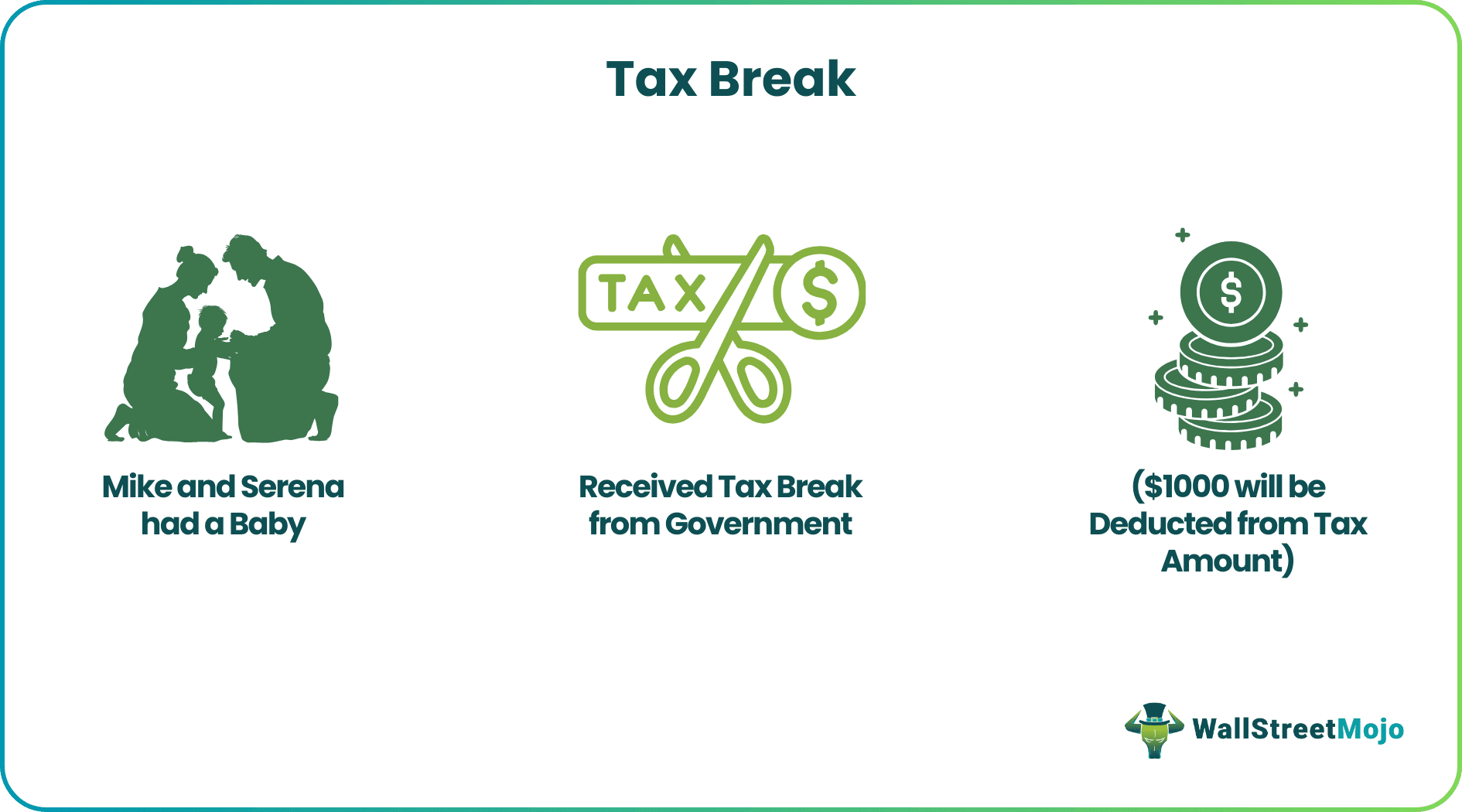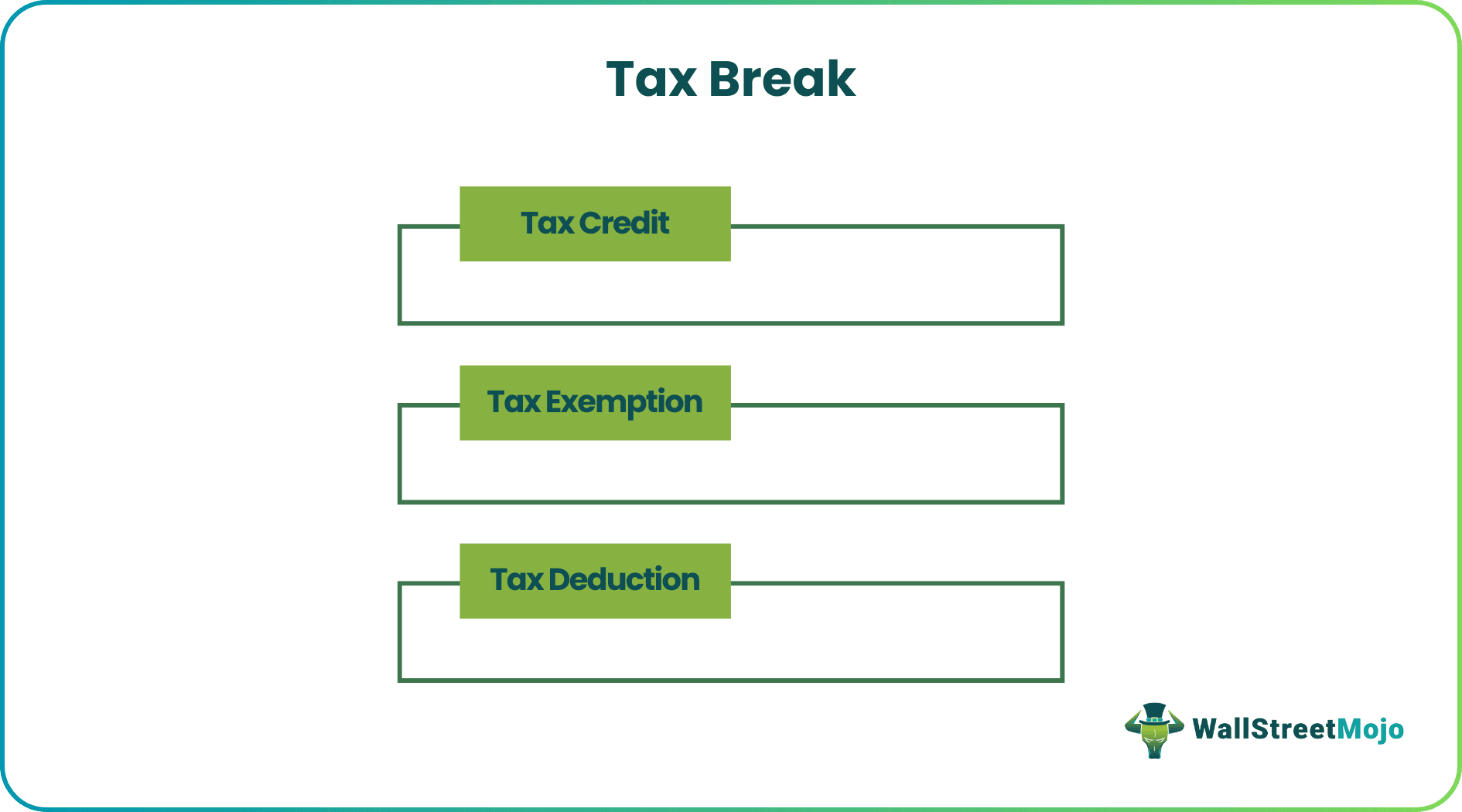Table Of Contents
What Is Tax Break?
A tax break can be defined as a tax advantage or concession in taxes allowed by the government to encourage the industries to scale up their investments which will ultimately bring a boost to the economy, and it can be received in various forms, such as excluding profits from tax returns or claiming tax deductions, etc.

The tax break in the United States provides a certain class of individuals with favorable tax-related treatment. They can be of numerous types, such as tax exemption, tax credit, tax deduction, etc. It usually means that the government has offered a tax reduction option, and the receiver of the same is eligible to receive a reduction in their taxes.
How Do Tax Breaks Work?
A tax break means the government has proposed a tax reduction for the taxpayers. When the government offers it, it means the taxpayer is entitled to receive tax reductions, which can be in the form of tax deductions, tax credits, and tax exemptions.
There are certain scenarios where a tax break will not even require the taxpayer to take any action if the same has any relation with an enhancement in the exemptions value claimed by him or receiving a reduction in the total income tax rates.
Tax breaks can allow taxpayers to lower their taxable income and reduce their tax implications owed to the government. There are several ways to use tax deductions to minimize taxable income. However, only a few individuals are aware of them, which is why they cannot take full advantage of them. It is always good to consult a tax expert like a tax lawyer or tax preparer concerning maximizing tax deductions. Tax experts can guide through deductions appropriately.
It is a misconception that deductions are only for the rich and renowned individuals. It is completely wrong since a variety of tax credits and tax deductions are available for middle and lower-class taxpayers. Itemizing is the factor that draws a dividing line in the era of deductions.
The government always passes laws concerning a tax break and how it functions. Any alterations in tax laws regarding federal income tax are approved by Congress and the president of the United States. It can be better understood with the help of an example, where a tax-payer fills out his tax return for the year and might receive a new tax credit that will allow him to minimize his tax implications for the same year.
The new tax credit received is a tax break offered by the government. The reason behind issuing it is to encourage the industries to make more investments, which will ultimately help boost the country's economy by leveraging the amount of tax the investors will need to spend. Another reason behind offering it could be to promote behaviors like attending college, purchasing energy-efficient appliances, etc.
Types
Tax breaks are availed every year when a taxpayer claims tax deductions so that he can minimize his taxable liability. The federal government is not at all under any compulsion to offer deductions. If they do, then it is certainly a tax break. The government offers tax exemptions, tax deductions, and tax credits every year.

- Tax Credit – The Tax Credit is the total sum of money that can be deducted from the taxes owed by the taxpayers to the government.
- Tax Exemption – Tax exemption can be defined as the monetary exemption of people, property, persons, transactions, and income from taxes that would otherwise have been levied on them.
- Tax Deduction – Tax deduction is a type of deduction which can help a tax-payer minimize his tax liability by minimizing his taxable income. The standard deduction and itemizing deductions are the two ways with which one can claim tax deductions.
Examples
Let us consider the following instances to understand the tax break meaning better along with checking how it works:
Example 1
When Bill filed his tax returns for 2012, he was eligible to receive a child tax credit, which amounts to $1,000. It would lower his tax implications by $1,000. It means Mike and Serena received a tax break from the federal government for delivering a baby. Sales taxes, health insurance premiums, charitable gifts, unusual business expenses, etc. are various tax breaks available to both entities and individuals. However, these breaks can be availed only in certain circumstances. For example, Mike and Serena welcomed a baby girl in 2012.
Example 2
Internal Revenue Service (IRS) reported extension of the tax breaks provisions under the Inflation Reduction Act for the energy efficient commercial buildings in 2023. This tax break 2023 rule states the maximum deduction allowance as $0.54, a $0.02 increase for each percentage point of annual reduction in the energy or power costs. The reduction must be more than 25 percent and the deduction would be applicable for each percentage point above the given threshold. All conditions remaining the same, for certain property, the increase is by $0.11, amounting to $2.68 for an increase in the annual energy and power reduction by each percentage point above 25%.
This adjustment or change in rule was introduced following the announcement of annual inflation adjustments in tax year 2023 that affected more than 60 tax provisions, including tax rate modification and other tax changes.
Tax Deductions as Tax Breaks
Tax deductions can help a taxpayer feel relieved from the burden of paying high taxes since he can reduce his tax liability by lowering his taxable income. It helps in the full elimination of certain income types from the tax return. It is regarded as ideal, and generally speaking, such tax breaks are only applicable in the cases of specific tax-payers. This type of exclusion can be seen in the cases of tax-payers living and working abroad, most or total social security income during retirement, etc.
Importance
IRS tax break matters not only for the taxpayers but for the government too. It helps the taxpayers minimize their taxable income, which ultimately helps in lowering the tax liability they owe to their government. From the government's point of view, offering it can help boost the country's economy since the industries will feel the urge to make more investments to enhance their revenue models.
Tax advisors and taxpayers are spending a lot of time determining the credits and deductions they are eligible to receive every year as they know that tax breaks minimize tax liability.
